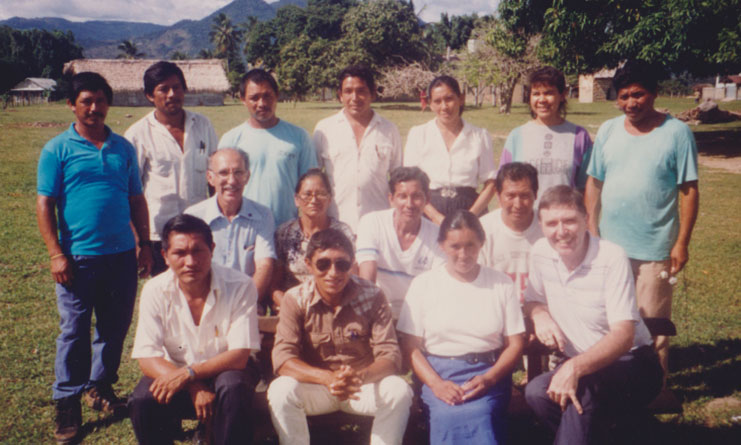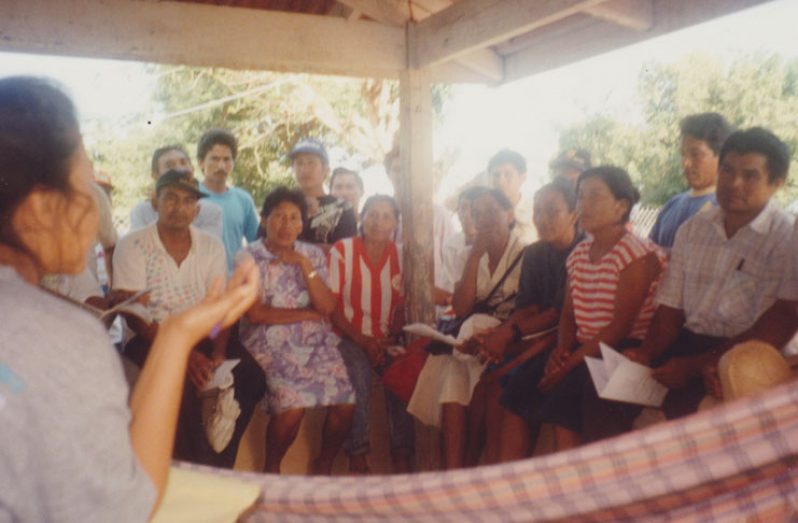The work of Dr.Laureen Pierre
LAUREEN Pierre (Dr.) was born and raised in the village of Hosororo, Region One. In 1971, she successfully completed the SSEE examination and attended the Bishops’ High School after being awarded a Hinterland Scholarship.
In her quest for higher education, it did not take long before she began to pursue studies for a Degree at the University of Guyana (UG) majoring in History with a minor in Spanish; then a UG Masters in Guyanese and West Indian History, focusing on Stephen Campbell, who, himself, was an Amerindian. Still not satisfied, she went on to pursue a doctorate at the University of Massachusetts, specialising in International Education – again focusing on Amerindian communities in Guyana.
“Over the years, apart from the fact that I worked as a Researcher for several years in the Amerindian Research Unit (ARI) at the University of Guyana, my interest was working with communities – specifically in Amerindian communities,” Dr. Pierre told the Pepperpot Magazine. “I taught in the Rupununi and at Mabaruma and so education was important for me. I saw education as being important to children and later on, I saw why it was also important to adults – and so it does not mean that because you left school the education process in your life could not go on. So in fact, now that I have a Doctorate in Education I focus more on adult and non-formal education, meaning that you do not have to be in a school to learn because learning is a continuous process.”

community development projects in Guyana, with special focus on the Indigenous
communities
AMERINDIAN WOMEN IN LEADERSHIP
Dr. Pierre told the Pepperpot Magazine that she was looking at what was happening in the 1980s and 1990s, where males dominated the leadership positions in Indigenous villages. But she recalled that in the 60s and 70s in particular, there were a few women whom she saw playing leadership roles. Upon reflection, Pierre asked herself the question, “How did they come to lead their communities; how did they break the barriers, what assisted them?”
She said that she later found out that through studies and observation, if the women are allowed the opportunities to soar at any level – whether it is in the church; whether it is in the health field; as a teacher…that is where they develop the confidence and acquire leadership skills and eventually the community would come to recognise their efforts and begin to take them (the women) more seriously.
“So I came to realise that if I am to begin to change anything; to transform communities, then education would play a great part, and this is whether we are dealing with the children, with the parents or with the men,” she said.
She added that she always tries to share messages that would reinforce some positive images and behavioural attitudes. She said that whether a person is teaching about health, education, sports etc., those messages should come through positively. Also that while people can’t change individuals and they can’t change lives they should strive to reinforce some of the messages which might allow change over time.
CHALLENGE IN CHANGING THEIR COMMUNITIES
Dr. Pierre said that so far she has had the opportunity to assist in helping people; especially women, do positive things for the improvement of their lives and that of their families. She said that in her own work she was very pleased with what she saw – the manifestation and the consequences; that it is possible for women to do things when given the opportunity, but that education plays a key role. Communities also play a major role – once they understand certain messages, the more supportive they would be to the project and who may be running it, she stated.
ADVANCEMENTS IN SOCIETY
She posited that the challenges now are even greater – the new technology; the way society has moved forward- even though many Amerindian women have gone beyond leadership roles in communities and are even now in every profession in Guyana, there are still some challenges. For many of them, even within their own communities, there are difficulties. Women, for example, still have to rear children; they still have to be with and take care of their families – even though they are now professional women they still have to deal with these things, she said.
CULTURAL PROJECTS
Dr. Pierre said she is now more involved in cultural projects as a volunteer. This is done as the team tries to sustain culture – Indigenous or any other culture for that matter; in ways that can create positive things and at the same time look for advancement, reform, and betterment.
“Right now we have a team in Rewa in the North Rupununi community – an initiative of Mr George Solomon. This is a group of artists who recently graduated from the Burrowes School of Art; an environmentalist; a recent graduate from UG; and a young historian who is Amerindian,” she said. This group is more involved in encouraging ‘art appreciation’, having workshops, environmental and other discussions. “So I am quite pleased to offer whatever assistance I can, and at the same time, knowing that the leader of the team is a woman – Ms Habi Asgar,” she said.
She said that she is very happy to continue to work on helping women to build their entrepreneurial skills “…because we just cannot look at one aspect of the development of women, we have to look at all aspects,” she said.
LITERACY, NUMERACY, MORAL DEVELOPMENT
Dr Pierre has also worked on the early development of children and it also included telling teachers and parents that literacy, numeracy and the moral development of children are all important.
In this regard, she said that she has given them some practical skills to help parents to ensure that the children could learn. “And, at the same time we were doing it with a lot of respect for their culture: their music; their dance; their drama were all incorporated into that,” she said.
Dr Pierre has worked extensively in and out of Guyana, gaining much experience and desire to use her experiences for the advancement of women in Guyana and their families. She has worked extensively in the field of social research, statistical work; in the capacities of regional coordinator as well as Resident Coordinator for the Caribbean Centre for Development Administration, among others. She has documented many research studies and received many awards.
In addressing the IWD theme for 2018: – Time is now: Rural and urban activists transforming women’s lives, she said: “I think that we do have to look at the particular context and apply what factors are influencing particular situations and see how we can respond; and while we are helping to effect transformation that we are conscious of how we are assisting in that process because we are helping other people to feel that they have the power and the potential and that they can use it.” (mercilinburke2017@gmail.com)




.png)









